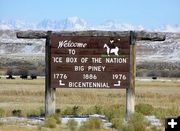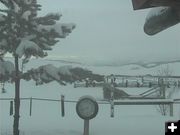Minnesota town lays official claim to ‘Icebox of the Nation’
Slogan also used for years by Big Piney, Wyoming, and Fraser, Colorado
by Dawn Ballou, Pinedale Online!
February 13, 2008
Is there a town in the United States that deserves official claim to the phrase, “Icebox of the Nation”?
Big Piney has used that phrase for years and has it on a sign posted on the highway on the south end of town.
The towns of International Falls, Minnesota, on the Canadian border, and ski town Fraser, Colorado, have been duking it out for years for the legal rights to the trademark to officially use the claim “Icebox of the Nation”. Fraser uses it on their town logo, International Falls wants it for marketing purposes. Fraser claims usage since 1956, International Falls since 1948. After several years of legal battles in renewals of state and federal trademarks, the United States Patent and Trademark office officially registered the slogan with International Falls on January 29, 2008 (Registration Number 3375139).
In their now official trademark, the City of International Falls has wordmarked “Icebox of the Nation” for use of the Goods and Services: “Promoting tourism and the use of International Falls for cold weather testing of products.” Just days after winning the trademark, the town broke their old cold temperature record of -37 below zero with a -40 below reading on Monday, February 11th.
We couldn’t find anything official online for how cold Fraser is claiming as their record, so we called the Fraser Visitor Center where two long-time residents told us they remember temperatures of -60 and -48 below zero there.
We decided to do some checking on historical data for our area and turned to always helpful Chris Jones, Meteorologist with the National Weather Service (NWS) in Riverton, to see what Big Piney’s historical records are for cold temperatures. He referred us to the Western Regional Climate Center in Reno, Nevada, which maintains historical records for daily climate statistics for towns in the western half of the United States.
The WRCC operates through the Desert Research Institute, a stand-alone institution within the Nevada System of Higher Education which does research on watershed, hydrologic sciences, atmospheric and ecosystem sciences. Below are historical records the WRCC has for days colder than 40 below zero for Big Piney. Just for fun, we also checked out records for Pinedale, and then looked for more towns with records of colder than -40 degrees in our area.
Big Piney:
1. January 1, 1974: -41
2. January 2, 1974: -42
3. January 3, 1974: -41
4. January 4, 1972: -46
5. January 10, 1962: -45
6. January 12, 1963: -41
7. January 18, 1984: -47
8. January 19, 1984: -43
9. January 22, 1962: -49
10. January 23, 1962: -45
11. January 25, 1949: -45
12. January 29, 1949: -43
13. January 31, 1979: -44
14. February 1, 1985: -44
15. February 6, 1989: -43
16. March 4, 1985: -60 (NWS says they are skeptical about this statistic)
17. December 21, 1990: -46
18. December 22, 1983: -46
19. December 23, 1983: -50
20. December 24, 1990: -47
Pinedale:
1. January 12, 1963: -44
2. February 1, 1951: -42
3. December 22, 1990: -49
Bondurant:
1. January 30, 1951: -56
2. February 1, 1951: -57
3. December 10, 1972: -51
Darwin Ranch:
1. January 1, 1979: -53
2. February 10, 1981: -62
3. November 27, 1976: -46
4. December 30, 1978: -53
LaBarge:
1. January 30, 1979: -42
2. February 1, 1985: -45
3. December 23, 1990: -52
Jackson:
1. January 1, 1979: -50
2. February 1, 1956: -44
3. December 31, 1978: -49
Near as we can tell, International Falls didn’t base their trademark claim on any proof of historical weather data, so we’re not sure really how the feds verify their claim to the phrase. Based on our quick research, Big Piney wouldn’t win the title either based on weather records, but we certainly won’t argue that it can get darn cold there! We wouldn’t be surprised if there are other towns that have historical data that beats the -62 we found just in our area at the Darwin Ranch.
If any readers knows of an official place that keeps the data for all the weather reporting stations across the U.S to determine cumulatively which town should really earn that title based on most record winter lows historically, and also which town wins the title for each year, we’d like to know where to find that data.
|

